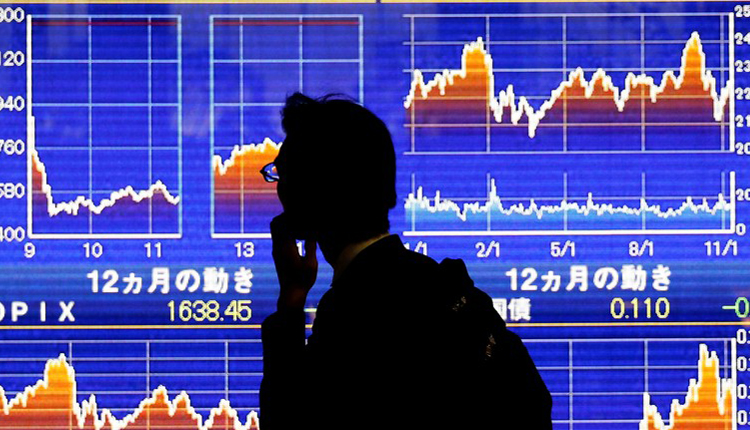Asia stocks dropped on Friday after a surprise tariff announcement from the United States overnight escalated trade tensions between Washington and Beijing.
U.S. President Donald Trump said Thursday that the U.S. is putting 10% tariffs on another $300 billion worth of Chinese goods starting Sept. 1.
In the wake of the unexpected move, mainland Chinese stocks tumbled on the day. The Shanghai composite fell 1.41% to about 2,867.84, the Shenzhen component slipped 1.42% to 9,136.46 and the Shenzhen composite shed 1.484% to approximately 1,539.86.
Over in Hong Kong, the Hang Seng index declined 2.35% to close at 26,918.58.
Responding to Trump’s latest salvo, China’s foreign ministry said Friday that the country does not want a trade war with the U.S. but is unafraid of fighting one.
U.S.-China trade war developments have roiled markets for more than a year, and there have been signs the rafts of additional tariffs from both sides are having real effects on economies around the world. As has been the case for most other days featuring increased hostilities between Beijing and Washington, Friday saw all other major Asia Pacific stock markets recording losses.
In South Korea, the Kospi declined 0.95% to close at 1,998.13. Australia’s S&P/ASX 200 slipped 0.3% to finish the session Down Under at 6,768.60 despite the country posting its fastest retail sales growth in four months. And the closely watched MSCI Asia ex-Japan index, a broad measure of the region, declined 1.71%.
Notably, the losses for Japanese stocks surpassed even those seen in the mainland Chinese markets: The Nikkei 225 plunged 2.11% to close at 21,087.16 and the Topix index also fell 2.16% to end its trading session at 1,533.46.
In addition to the trade war-induced weakness around the region, Japan’s shares may have been dragged lower by heightening tensions between Tokyo and Seoul.
Trump’s surprise tariff announcement came after the two countries concluded a round of trade talks this week, with negotiations set to resume in Washington in early September.
“It is unclear what caused Trump’s latest intensification of the trade war,” Tapas Strickland, an economist at National Australia Bank, wrote in a morning note. “Worryingly though for the global economy it appears Trump has gone all in and is hoping that China buckles under the pressure and caves to US demands.”
Strickland explained that in such a scenario there is “no way for China to fold without losing face since it goes against China’s core demands of sincerity and the removal of existing tariffs.”
“It is possible then that China will retaliate with an intensification of non-tariff barriers, as well as further Chinese stimulus to ward off headwinds,” he added.
Trump and Chinese President Xi Jinping reached a ceasefire in June at the G-20 summit in Japan after trade talks collapsed in May that prompted a steep U.S. tariff hike on $200 billion of Chinese goods.
Apple suppliers in trouble
Shares of Apple suppliers in Asia took a hit in Friday afternoon trade, following the fall in the Cupertino-based tech giant’s stock Thursday stateside.
In Japan, component supplier Murata Manufacturing saw its stock drop 1.62% while South Korea’s LG Display fell 5.56%.
Over in Hong Kong, lens manufacturer Sunny Optical plunged 7.77%. Taiwanese chipmaker Taiwan Semiconductor Manufacturing Company also fell 1.95% while Hon Hai Precision Industry — commonly known as Foxconn — declined 3.08%.
Apple has been among the companies caught in the crossfire of the ongoing U.S.-China trade fight, as it assembles iPhones and other products in China, leaving it at risk of being impacted by any tariffs placed on Chinese exports.
Japan removes South Korea from trade white list
Japan’s cabinet on Friday approved a plan to remove South Korea from a so-called “white list” of countries that enjoy trade privileges with Tokyo. In response, South Korea’s finance minister said the country will take steps to drop Japan from its list of countries with fast-track export status.
The moves followed after Japan last month placed restrictions on exports of three important high-tech materials to South Korea that are used by tech companies to make memory chips and display panels.
Shares of major memory chipmakers in South Korea fell: Samsung Electronics declined 0.55% and SK Hynix was down 2.06%.
Manufacturing shares were also down: Steelmaker Posco fell 3.13%, Samsung Heavy Industries declined 2.26%, Hyundai Steel slipped 0.66% and Lotte Chemical dropped 1.73%.
Japan said Friday’s measures were based on national security concerns: It cited Seoul’s insufficient export controls as well as the erosion of trust after South Korean court rulings ordered Japanese companies to compensate wartime forced laborers, Reuters reported.
For its part, South Korea relies heavily on Japanese exports of intermediate parts and materials, particularly electronics components and chemical products, in its manufacturing industry.
